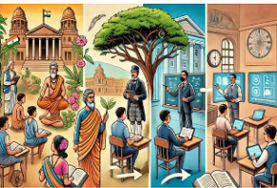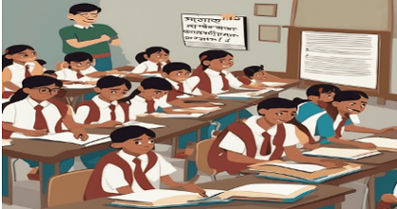Introduction
Only in the past decades has the education landscape in India seen a sea of change due to tremendous technological reforms and transformation in its policy arena.
India’s education landscape has always been based on old traditional methods, which have shifted towards digital learning, critical thinking, and more skill-oriented training to achieve international standards.
A Legacy of Traditional Learning
India’s education system has long been influenced by rote learning and examination-driven assessments, especially after British colonial rule formalized standardized curricular and rigorous testing.
This structure was rooted in memory-based assessments and a fixed curriculum, which, while instilling discipline and knowledge, limited the development of analytical and creative thinking.
This legacy has led to the disjoint between what is taught in schools and what is required in the modern workforce.
In many traditions, schools focus more on theoretical knowledge, and practical application is not emphasized resulting in graduates’ difficulties in getting employed or adapting to changing professional environments.
Policies Driving Changes
In the recent past, policy initiatives have catalyzed shifts towards more holistic education models.
The recent landmark initiative has been the National Education Policy (NEP) 2020, which is a watershed in the effort to make education in India more flexible, inclusive, and skill-oriented.
Early Childhood Care and Education (ECCE):
The NEP recognizes that foundational learning is in great need; it places importance on early education of 3 to 6-year-olds, to go along with a play-based curriculum.
Multidisciplinary and Flexible Curriculum:
The policy promotes a more flexible curriculum structure, encouraging students to explore various subjects and skills and prompt vocational training in technology and arts.
Focus on Critical Thinking and Skill-Based Learning:
Focusing on critical thinking, problem-solving, and skill-based learning in NEP makes most of the rote-based learning irrelevant.
Regional languages will be used, and it will help facilitate foundational education to a larger and more diverse population of students residing in the rural belts and non-English speaking belts.
NEP is changing like no other policy, announcing finally, a shift toward holistic, student-centric learning capable of articulating the diversity of this nation – linguistic, cultural, and otherwise.
Digital Learning and EdTech Revolution
Digital learning has been growing exponentially in India’s educational scenario. The pandemic has fast-forwarded this change in the mode of instruction from schools and colleges, and it has opened up new avenues of learning through EdTech platforms and digital resources.
Millions accessed quality education through BYJU’S, Unacademy, and Vedantu, particularly from the rural areas.
Key EdTech Impacts for India
Access improved:
Edtech opens up learning opportunities to rural and underserved regions through the delivery of quality teachers and resources that till now such regions had lacked opportunities to access.
Personalization:
Advanced data analytics and artificial intelligence make EdTech an opportunity for the articulation of bespoke learning experiences for students. It allows the students to learn at their own pace, and to track areas needing improvement.
Increasingly, video, quizzes, and simulations have been added to such a scenario to increase the interactivity and appeal for the highly digitalized generation that is so quintessentially characteristic of online learning.
However, EdTech has also underlined an unpleasant “digital divide” in India. Urban students thrive with the boom of the digital era, while rural India misses proper internet access, digital devices, and digital literacy, increasing this learning inequality and making a huge challenge to bridge this divide.
Vocational Training and Skill-Based Education
The Indian Government has always perceived the significance of an economy that is skill-based for its manpower pool. The need for developing skilled manpower has thus always been put forth.
The “Skill India” mission, launched in 2015 plans for industry-relevant skills empowerment of young Indians, promoting skill-based education besides formal schooling.
NEP 2020 even incorporates vocational education within the school curriculum and helps students get hands-on training in coding, digital marketing, and entrepreneurship from an early age.
This aligns education to what is required by the industry, reduces unemployment levels, and in turn, makes the graduate more adaptable to changing requirements in the labor market.
Multilingualism and Cultural Relevance
The Indian education system does have its unique problems since India is a culturally and linguistically diversified country. Therefore, uniformity in education delivery is completely ruled out with 1,600 odd spoken languages.
Inculcation of multilingual education, especially at the early stages according to NEP, is a progressive step toward ensuring completeness and better absorption among young minds.
Learning in one’s mother tongue enhances cognitive skills and establishes a better bond with cultural heritage. This multilingualism also gives identity and self-esteem to learners from different backgrounds while learning, hence making education inclusive and meaningful.

Challenges and Barriers
While India’s educational evolution holds great promise, it faces several challenges:
Infrastructure Deficits:
Most of the rural schools are deprived of fundamental infrastructure, from classrooms and blackboards to clean drinking water. Such an environment hinders new policy implementation.
Teacher Preparation and Quality:
A good quality education reform rests on well-prepared teachers. However, most Indian teachers are either not well prepared or professionally developed, mainly due to the digital tools used.
Financial Inequities:
Financial inequities often disqualify students from quality education, and the poor cannot afford private schooling or costly digital resources.
Assessment Reforms:
While the policy reforms encourage skill-based learning, the assessment system remains more examination-centric. It would be required to have an assessment system that tests the critical thinking ability and practical skills of a learner to complete the process of change effectively.
Future Changes: Possibilities for Change
Despite these dilemmas, India’s education segment stands at a crossroads. The rising acceptance of digital learning and progressive policy reforms have opened the door for unprecedented change in education.
Public-Private Partnerships:
A confluence of the government and private players to surmount the issue of resource and infrastructure constriction would not only improve facilities but also bridge the gap in digital access for students.
For a holistic workforce, an emphasis on STEM and innovation is very much along with arts and humanities orientation at a deeper level.
Assessment Models Based on:
Models of assessment that are based on problem-solving approaches, collaboration, and creativity will introduce students to thinking beyond the ambit of texts and stand ready to face the real challenge that comes their way.
Teachers’ Empowerment:
Consecutive professional development and training programs for teachers would be offered through which enhanced teaching standards, and flexible teachers with innovative methods and technology, will improve the standards of learning.
Conclusion
That is the evolutionary journey of Indian education toward inclusiveness, flexibility, and relevance. The structure would be on critical thinking, digital literacy, and cultural inclusion.
India is preparing its young population for innovation and adaptability in a future that will require both of these virtues. Much remains to be done, but the focus on comprehensive reforms and correction of disparities will ensure that this vision is met.
This shift will allow India to hope that the learning system in academe would not only empower students with the knowledge needed in academics but also equip them with the skills, confidence, and cultural grounding for life in a new-globe-centric world.
-AKRITEE SINHA
MUST READ: TRANSFORMATION PATIENT CARE WITH ARTIFICIAL INTELLIGENCE SOLUTIONS


